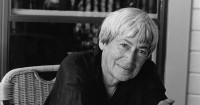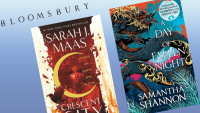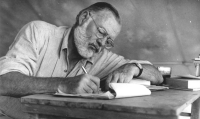
Why Are Debut Novels Failing to Launch?
esquire.com – Thursday May 30, 2024

For first-time writers, it’s harder than ever to break out. That poses an existential crisis for publishing—and disturbing limits on your access to exciting new voices.
On the Road was not Jack Kerouac’s first novel, but you’d be forgiven for thinking as much.
Though 1957’s On the Road is widely considered to be Kerouac’s “debut,” the author’s first novel, The Town and the City, was in fact published in 1950. By all measures, it flopped. Between that book and the launch of On the Road, Kerouac started working with the literary agent Sterling Lord, who believed he could be the voice of his generation and laid the groundwork for his public reception as such. What, exactly, did Sterling Lord do to prime Kerouac’s audience? From 1953 to 1957, he leveraged his own professional connections to place excerpts of On the Road in magazines like The Paris Review and New World Writing, building hype for the young novelist’s next book. This is common practice today, but in the fifties, it was a novel solution to the name-recognition problem faced by unknown writers.
After a few years of seeing Kerouac’s byline in print, the thinking went, readers would pay attention when they recognized his name on the cover of On the Road. It was one of the first literary “debuts” of its kind, explains Temple University professor Laura McGrath, author of the forthcoming book Middlemen: Literary Agents and the Making of Contemporary American Literature. McGrath argues that Sterling Lord created the blueprint for the literary “debut” phenomenon we still see today.

Why do books have chapters? How writing changed from antiquity to children's books and streaming
abc.net.au – Sunday May 26, 2024

Nicholas Dames remembers the first time he really got thinking about a very obvious but largely invisible writing device.
It was around two decades ago, when he was completing a PhD in English and American literature.
"A friend of mine, who was not an academic, over drinks one night, just blurted out to me, 'why do novels have chapters?'," the Columbia University humanities professor tells ABC RN's Late Night Live.
"I realised I hadn't the faintest clue how to answer that question. It was one of those, 'why is the sky blue' questions."
In the years that followed, Professor Dames returned to this question again and again, so he decided to explore the history of the chapter.
The topic may sound deeply academic, but it's not all laborious details about medieval tomes.
At the heart of this history is how we tell stories.
And from a child's development to an evening on the couch watching Netflix, the chapter affects our lives in many unnoticed ways.

Ursula K. Le Guin on How to Become a Writer
lithub.com – Saturday May 25, 2024

How do you become a writer? Answer: you write.
It’s amazing how much resentment and disgust and evasion this answer can arouse. Even among writers, believe me. It is one of those Horrible Truths one would rather not face.
The most frequent evasive tactic is for the would-be writer to say, But before I have anything to say, I must get experience.
Well, yes; if you want to be a journalist. But I don’t know anything about journalism, I’m talking about fiction. And of course fiction is made out of experience, your whole life from infancy on, everything you’ve thought and done and seen and read and dreamed. But experience isn’t something you go and get—it’s a gift, and the only prerequisite for receiving it is that you be open to it. A closed soul can have the most immense adventures, go through a civil war or a trip to the moon, and have nothing to show for all that “experience”; whereas the open soul can do wonders with nothing. I invite you to meditate on a pair of sisters. Emily and Charlotte. Their life experience was an isolated vicarage in a small, dreary English village, a couple of bad years at a girls’ school, another year or two in Brussels, which is surely the dullest city in all Europe, and a lot of housework. Out of that seething mass of raw, vital, brutal, gutsy Experience they made two of the greatest novels ever written: Jane Eyre and Wuthering Heights.

Our Interactions in This Business
By G. Miki Hayden
Instructor at Writer's Digest University online and private writing coach
firstwriter.com – Sunday May 19, 2024

At the heart of much of what we accomplish in this life, very much including how well we do as writers, lies how we conduct our relationships, knowingly or unknowingly.
For instance, I’m pretty sure my neighbor is annoyed with me. From time to time I’ll edit a piece of writing for him, as I did recently. I don’t charge him anything, but he will sometime thereafter take me to lunch. Generally, we’re on quite good terms, but what he sent me this last time had a tone that I didn’t think was his, and the way the material was phrased I felt was unwise. Yet the letter—that’s what the note was—made me bristle. The intent was to let a government entity know that the group requesting some action had a distinct amount of power and had better be listened to.

How sci-fi writer JG Ballard's computer poems predicted ChatGPT
bbc.com – Saturday May 11, 2024

In the 1970s, science fiction writer JG Ballard was intrigued by the growing capabilities of computers – so used one to compose poems. They were a first step on the road to ChatGPT.
The novelist and short story writer JG Ballard, is known for conjuring warped and reimagined versions of the world he occupied. Dealing with strange exaggerations of realities and often detailing the breakdown of social norms, his unconventional works are hard to categorise.
Sitting on the edge of reality, these unsettling visions often provoked controversy. Eschewing a science-fiction of the distant future, Ballard described his own work as being set in "a kind of visionary present".
Today, as we contemplate generative AI writing texts, composing music and creating art, Ballard's visionary present yet again has something prescient and fresh to tell us.
In an interview from 2004, the author Vanora Bennett suggested to Ballard that he writes about "what is just about to happen in a given community". Asked about what "kind of real-life event" inspired the ideas in his fiction Ballard responded:
I just have a feeling in my bones: there's something odd going on, and I explore that by writing a novel, by trying to find the unconscious logic that runs below the surface and looking for the hidden wiring. It's as if there are all these strange lights, and I'm looking for the wiring and the fuse box.
The topics in Ballard's fiction frequently reveal just how highly attuned he was to the subtleties of the emerging technological and social shifts that were, as he puts it, just below the surface. The fuse box of society was often rewired in his ideas.
And with generative AI there is undoubtedly something odd going on, to which Ballard's attention seems to have been drawn long before it even happened.

BookTok’s influence on publishing is set to last
ft.com – Tuesday May 7, 2024

The bursting of the pandemic sales bubble has been sharp and painful for sectors such as online retail. In publishing, an unlikely source — social media — has helped avoid a hard landing.
Social media should, in theory, be an enemy of the publishing industry given the competing pressures on consumers’ time. Since the pandemic, though, it has produced growth for once-niche genres such as fantasy and propelled authors who were little known to mainstream audiences on to bestseller lists. This will not be a fleeting phenomenon.
BookTok is a community within the video app TikTok in which influencers post content such as reviews of their favourite books. Similar groups can be found on YouTube or Instagram. Yet it is BookTok that has shaken up the sometimes fusty literary world, turbocharging sales of authors such as Sarah J Maas, Colleen Hoover and Alice Oseman among younger readers.

The State of the Crime Novel, Part 1: Writing Life
crimereads.com – Tuesday April 30, 2024

Once again, the Edgar Awards are upon us, and once again, I’ve had the privilege of asking dozens of great writers to contribute to our annual roundtable discussion on the state of the genre. This year’s roundtable, like in previous years, is divided into two parts: the first, running today, is focused on craft advice and the writing life, while the second, running tomorrow, will address issues in the genre and the future of crime writing. Thanks so much to the more than 30 nominees who sent in thoughtful, fascinating, and often hilarious responses. The award ceremony is this Wednesday night, and you’ll be able to follow along on social media as winners are announced or take a look at CrimeReads first thing on Thursday morning.
WHAT IS YOUR ADVICE FOR WRITERS WHO ARE JUST STARTING OUT? AND WHAT’S THE BEST PIECE OF WRITING ADVICE YOU’VE EVER GOTTEN?
William Kent Krueger (nominated for Best Novel – The River We Remember): First piece of advice: Write every day, and write because you love it, not because you hope you’ll get rich and famous from the effort. Second piece of advice: Marry someone with a good job.
The best piece of advice given to me when I was about to become a published author was to get to know the booksellers. If the booksellers like you and appreciate your work, they’ll sell you like crazy and spread the word. I found this to be true.

The one-man-band literary review that’s outpacing the monthly magazines
inews.co.uk – Tuesday April 30, 2024

Ed Needham edits and publishes Strong Words almost singlehandedly from a room in his west London home
Strong Words is an extraordinary magazine about books. Each edition runs to 84 pages and 45,000 words, including reviews of up to 35 new novels and volumes of non-fiction. This writing and reading is done, almost entirely, by one person.
“It is a seven-day-a-week job,” says Ed Needham, who edits and publishes Strong Words from a room in his west London house. “I worked out that it’s the equivalent of writing The Great Gatsby every issue and reading the equivalent of War and Peace every week.”
Such is Needham’s devotion to literature that he has followed this punishing schedule for six years and Strong Words has reached its 50th issue, which is testimony to the quality of the publication and the validity of its founding mission: to write about books in the engaging format of a popular magazine.

Ernest Hemingway’s Advice to Aspiring, Young Writers (1935)
openculture.com – Thursday April 11, 2024

Here in the twenty-twenties, a hopeful young novelist might choose to enroll in one of a host of post-graduate programs, and — with luck — there find a willing and able mentor. Back in the nineteen-thirties, things worked a bit differently. “In the spring of 1934, an aspiring writer named Arnold Samuelson hitchhiked from Minnesota to Florida to see if he could land a meeting with his favorite author,” says Nicole Bianchi, narrator of the InkWell Media video above. “The writer he had picked to be his mentor? Ernest Hemingway.”
What Hemingway offered Samuelson was something more than a literary mentorship. “This young man had one other obsession,” Hemingway writes in a 1935 Esquire piece. “He had always wanted to go to sea.” And so “we gave him a job as a night watchman on the boat which furnished him a place to sleep and work and gave him two or three hours’ work each day at cleaning up and a half of each day free to do his writing.” To Hemingway’s irritation, Samuelson proved not just a clumsy hand on the Pilar, but a fount of questions about how to craft literature — something Hemingway gives the impression of considering easier done than said.
Nevertheless, in the Esquire piece, Hemingway condenses this long back-and-forth with Samuelson into a dialogue containing lessons that “would have been worth fifty cents to him when he was twenty-one.” He first declares that “good writing is true writing,” and that such truth depends on the writer’s conscientiousness and knowledge of life. As for the value of imagination, “the more he learns from experience the more truly he can imagine.” But even the most world-weary novelist must “convey everything, every sensation, sight, feeling, place and emotion to the reader,” and that requires round after round of revision, so you might as well do the first draft in pencil.

The Importance of a Great Setting in Crime Fiction
crimereads.com – Monday April 1, 2024

Some years ago, I was working on a draft of my first real mystery thriller. In the opening pages, I included a bit of description meant to establish the location of the story (my hometown, Gainesville) and the time of year (late spring, the most miserable season in Central Florida). When I submitted the chapter to a writing workshop, one of the more experienced writers in the group immediately commented: “You need to cut all this setting stuff. Thriller fans don’t care about setting. They want to get to the action, quick.”
Like most writers, I passionately despise criticism of any kind, but this rankled more than most. It rankled, of course, because I knew that the writer who had made this comment (a very elegant and smart older lady with a couple of published novels under her belt) was partially right. Not about the “thriller readers don’t want to read about setting” part (I totally disagreed with that portion of her response; my disagreement is, in fact, the topic of this essay), but with the fact that I was rendering my novel’s setting improperly. That is, I was describing the setting in a very lazy and arbitrary manner, disconnected from what was actually happening in my main character’s mind or, for that matter, in the plot.
Get the free newsletter | Submit a news item or article | Get Writers' News for your website





